MobileNet v3
onnx 导出参考:torchvision onnx 模型导出_星魂非梦的博客-CSDN博客
1. 模型描述
MobileNet v3 来自论文:“Searching for MobileNetV3”.
| Model structure | Top-1 error | Top-5 error |
|---|---|---|
| MobileNet V3 Large | 25.96 | 8.66 |
| MobileNet V3 Small | 32.33 | 12.6 |
| Model structure | 模型大小 |
|---|---|
| MobileNet V3 Large onnx | 22.1 MB |
| MobileNet V3 Small onnx | 10.3 MB |
2. onxx 导出
参考:轻量化模型之mobilenet v2_星魂非梦的博客-CSDN博客
由于 Onnx support hardswish in opset-14 version. 所以opset设为14,需要修改下导出代码:
export_onnx(model, im, file, 14, train = True, dynamic = False, simplify=True) # opset 14 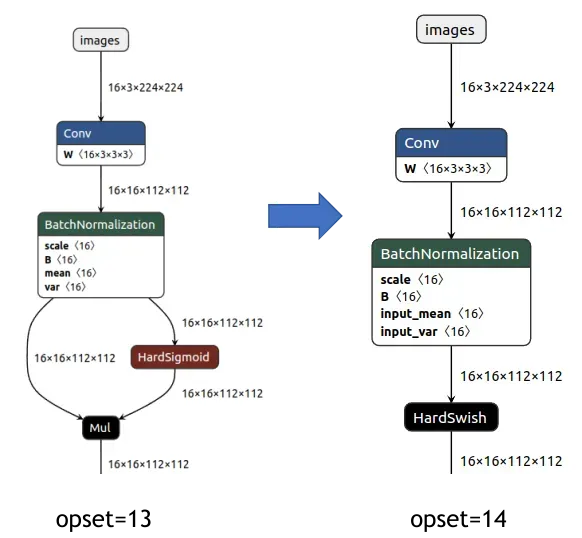
MobileNet v3 中使用了3种激活函数,分别为:Relu、HardSwish和HardSigmoid(SE模块中使用)。
Hardsigmoid — PyTorch 1.11.0 documentation
Hardswish — PyTorch 1.11.0 documentation
torchvision 中有两个 MobileNet v3 模型我们先介绍 MobileNet V3 Small。
3. MobileNet V3 Small
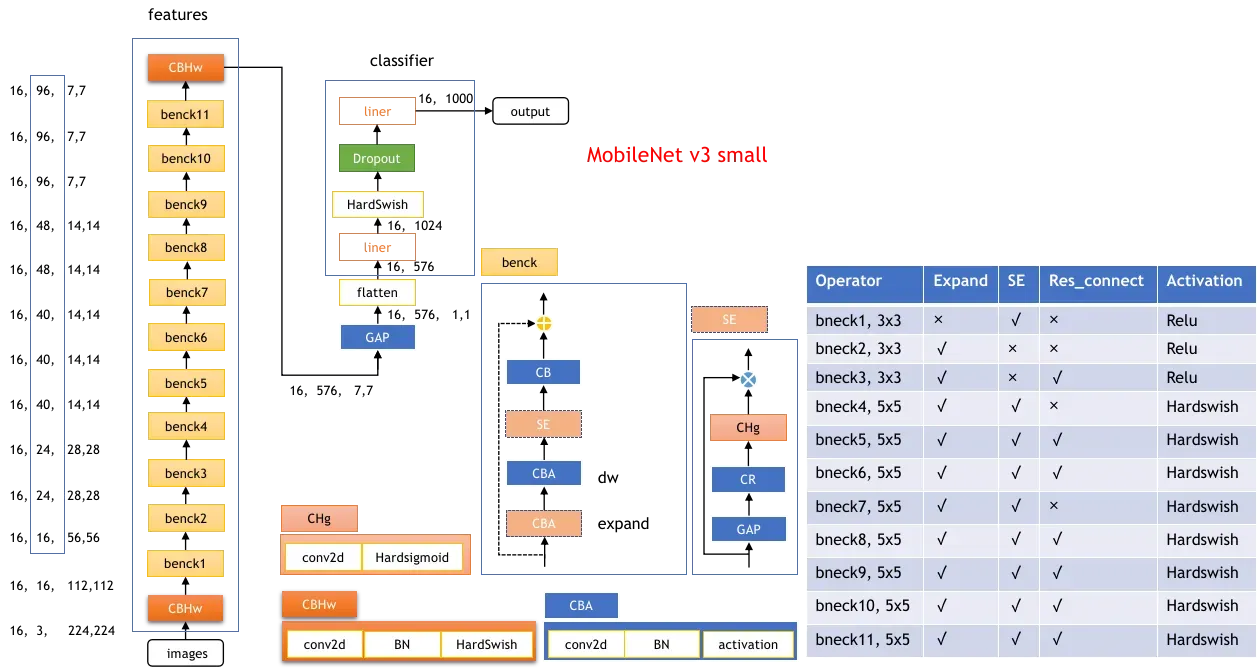
上图中,虚线部分表示该模块可选,见上图右表。上表中的 3×3, 5×5 为benck中CBA(dw)的卷积核大小。
论文中:
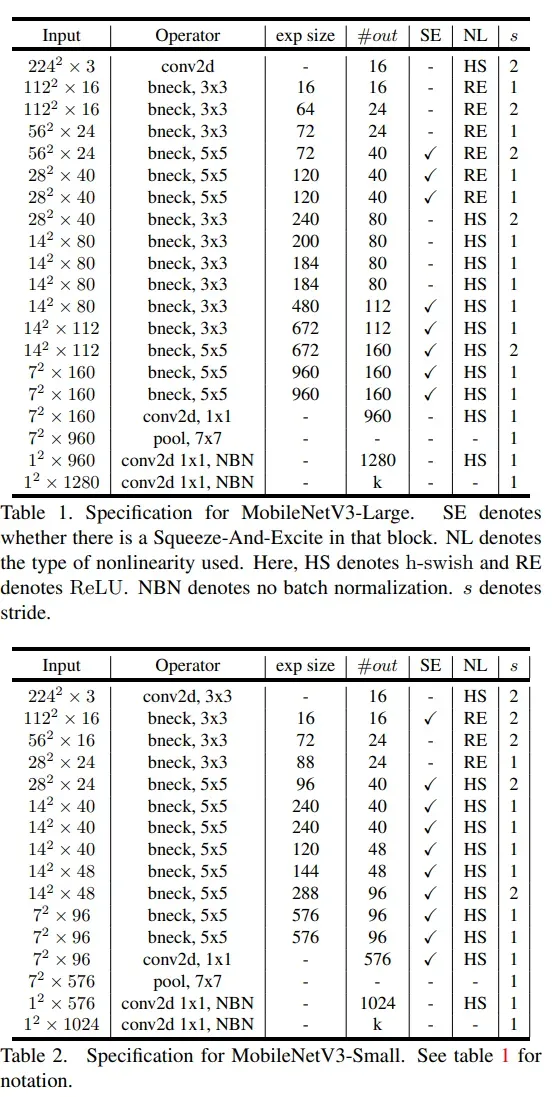
补充:
python partial函数
functools.partial(func[,*args][, **kwargs])第一个参数是函数,后面的是参数。这在SE 模块中被使用:
se_layer: Callable[..., nn.Module] = partial(SElayer, scale_activation=nn.Hardsigmoid)SElayer 代码如下:
class SqueezeExcitation(torch.nn.Module):
def __init__(
self,
input_channels: int,
squeeze_channels: int,
activation: Callable[..., torch.nn.Module] = torch.nn.ReLU,
scale_activation: Callable[..., torch.nn.Module] = torch.nn.Sigmoid,
) -> None:
super().__init__()
self.avgpool = torch.nn.AdaptiveAvgPool2d(1)
self.fc1 = torch.nn.Conv2d(input_channels, squeeze_channels, 1)
self.fc2 = torch.nn.Conv2d(squeeze_channels, input_channels, 1)
self.activation = activation()
self.scale_activation = scale_activation()
def _scale(self, input: Tensor) -> Tensor:
scale = self.avgpool(input)
scale = self.fc1(scale)
scale = self.activation(scale)
scale = self.fc2(scale)
return self.scale_activation(scale)
def forward(self, input: Tensor) -> Tensor:
scale = self._scale(input)
return scale * input上图中的benck 模块代码如下:
class InvertedResidual(nn.Module):
# Implemented as described at section 5 of MobileNetV3 paper
def __init__(self, cnf: InvertedResidualConfig, norm_layer: Callable[..., nn.Module],
se_layer: Callable[..., nn.Module] = partial(SElayer, scale_activation=nn.Hardsigmoid)):
super().__init__()
if not (1 <= cnf.stride <= 2):
raise ValueError('illegal stride value')
self.use_res_connect = cnf.stride == 1 and cnf.input_channels == cnf.out_channels
layers: List[nn.Module] = []
activation_layer = nn.Hardswish if cnf.use_hs else nn.ReLU
# expand
if cnf.expanded_channels != cnf.input_channels:
layers.append(ConvNormActivation(cnf.input_channels, cnf.expanded_channels, kernel_size=1,
norm_layer=norm_layer, activation_layer=activation_layer))
# depthwise
stride = 1 if cnf.dilation > 1 else cnf.stride
layers.append(ConvNormActivation(cnf.expanded_channels, cnf.expanded_channels, kernel_size=cnf.kernel,
stride=stride, dilation=cnf.dilation, groups=cnf.expanded_channels,
norm_layer=norm_layer, activation_layer=activation_layer))
if cnf.use_se:
squeeze_channels = _make_divisible(cnf.expanded_channels // 4, 8)
layers.append(se_layer(cnf.expanded_channels, squeeze_channels))
# project
layers.append(ConvNormActivation(cnf.expanded_channels, cnf.out_channels, kernel_size=1, norm_layer=norm_layer,
activation_layer=None))
self.block = nn.Sequential(*layers)
self.out_channels = cnf.out_channels
self._is_cn = cnf.stride > 1
def forward(self, input: Tensor) -> Tensor:
result = self.block(input)
if self.use_res_connect:
result += input
return result4. MobileNet V3 Large
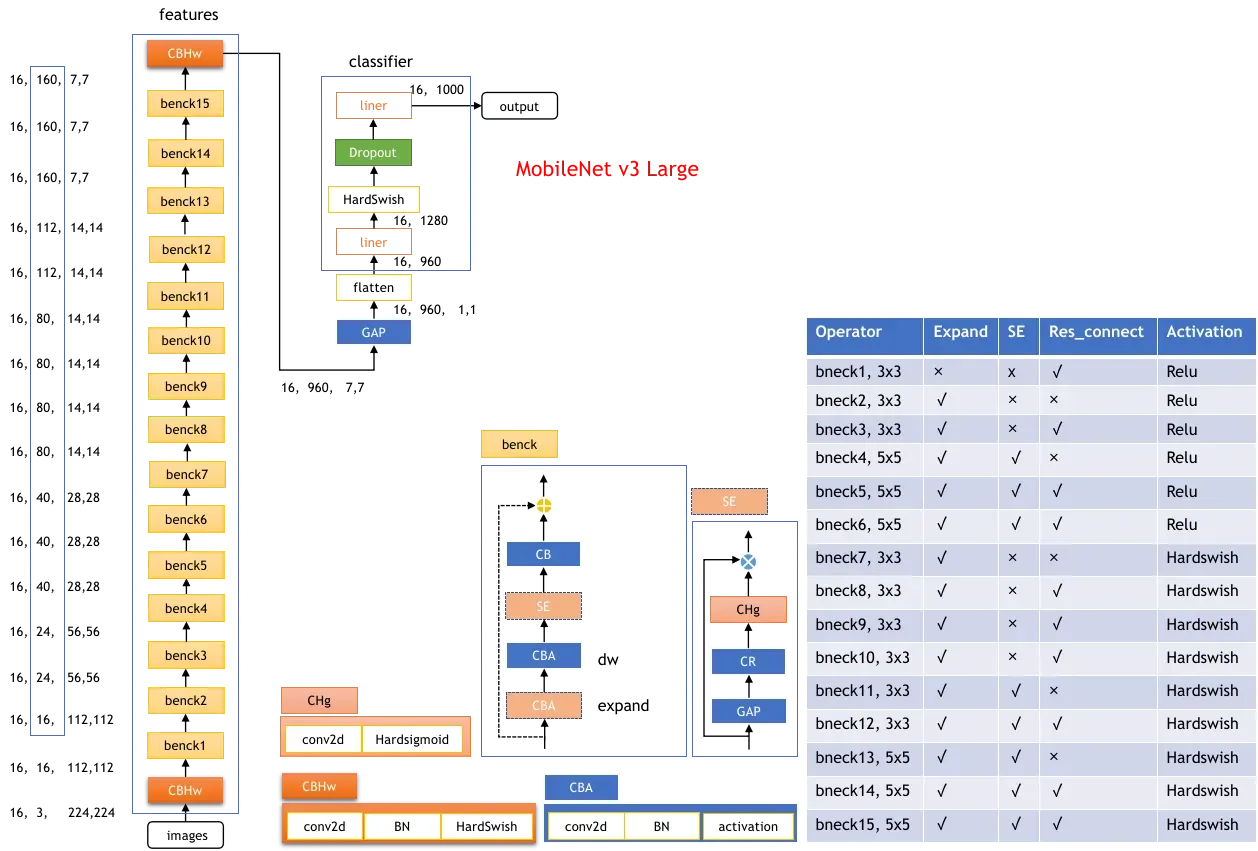
5. 核心模块
InvertedResidual:
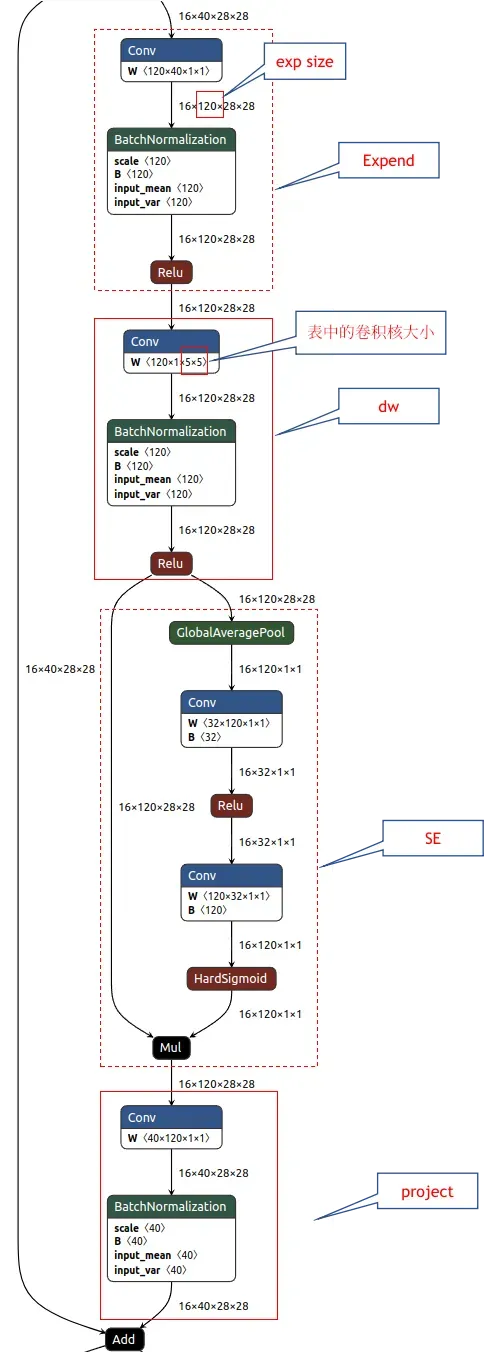
上图为选取的一个代表模块,其中虚线部分可能不存在。具体看上面图。
此外,我自己导出的 onnx 文件链接:
文章出处登录后可见!
已经登录?立即刷新
